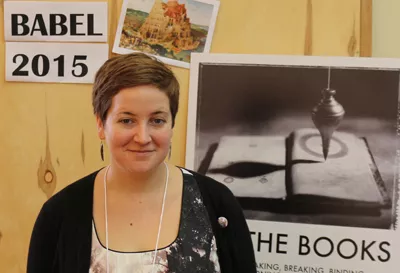Golding Opportunity
Department of English & Drama prof from UofT Mississauga explores the relationship between physics and literary form in the English Renaissance
Initially Professor Liza Blake had ambitions to be Agent Dana Scully from the X-files. However an intro Biology class during the first year of her undergrad program at The George Washington University in DC had her questioning if this path was the right fit.

“I didn’t want to do English literature because, based on my experience in high school, English literature meant to me the study and admiration of dead white men,” says Blake. “And the taste of English interpretation introduced in high school was not at all what I wanted to do.”
Flash-forward 10 years and Blake is nestled in her office as an Assistant Professor in the Department of English & Drama at the U of T Mississauga, surrounded by shelves filled with English-literature tomes, among the science-fiction selections. Surprisingly the turnaround catalyst for her scholarly pursuits was a class on Shakespeare. Blake reasoned that, since Shakespeare was “the ultimate dead white man,” if she could make it through a course on him, English may be the major for her.
“I just happened to have a wonderful Shakespeare professor, who said ‘we are not here to admire Shakespeare and how great a writer he is, we’re here to learn how to analyze texts critically, and use them to think new and interesting thoughts,’” says Blake. “I figured: now this is something I can do.”
And she has done it ever since, currently casting a critical eye mainly to the texts of early modern English literature, with a special focus on writer Arthur Golding, who was a prolific translator in the 16th century, but also investigating the work of Edmund Spenser, George Chapman, Ben Jonson, John Milton, and, yes, William Shakespeare.
Perhaps a carryover interest from her predilection for X-files and science fiction, and a bit of a nod to her parents who are both scientists, Blake’s work maintains a slight science bent in its exploration of these English Renaissance writers as she looks to the intersection of literature and science in this period, which gave rise to and saw the development of the scientific revolution, and carries through to the late 17th century.
“I am interested in the long tradition of natural philosophy in early modern English literature. My book is about philosophies about the basic makeup of the material world and the rules governing it, which in the English Renaissance was referred to as physiologia,” says Blake.
“The work I do is figuring out what Golding was doing in his translation to actually turn Ovid into a natural philosopher, and how is he then contributing to conversations about natural philosophy.”
Blake says the time period in her research is interesting because it predates the science-literature divide that is prominent today, where literature is regarded as “parasitic” to prevailing scientific wisdom. She gives the example of science fiction, where the science in the novel is considered as doing the intellectual heavy lifting, while the science fiction harnesses the science in order to drive the plot.
“This division that we now have between science being culturally dominant and literature drawing on it but not adding is something that my period invented, but it wasn’t quite established yet, even by the 1670s,” says Blake.
“So if you take the long history of natural philosophy seriously, what you see is literary and scientific texts are both doing equivalent cultural work with fundamental arguments about what nature is and how it works.”
Blake feels one of the biggest impacts for her work is in her teaching where she has contributed to the shaping of curriculum. She currently teaches a course at UTM called “Science and Fiction in the English Renaissance,” where her students read about some of the radical experiments conducted by the Royal Society. She says science majors sometimes show up expecting an entirely different class.
With her research though, Blake feels that her work has particular resonance today, despite the current “uneven relationship” between science and literature, in order to consider these two forces as more comparable in a cultural milieu.
“I think that looking at earlier periods provides a model for thinking about science and literature as potentially equal, even if they aren’t anymore today, and the problem of the epistemological status of science is one that is definitely reverberating more widely now,” says Blake.
“The larger questions about how science relates to other disciplines and how can we think about science as one epistemology among others, without undermining its claims, is absolutely crucial.”
By Carla DeMarco
